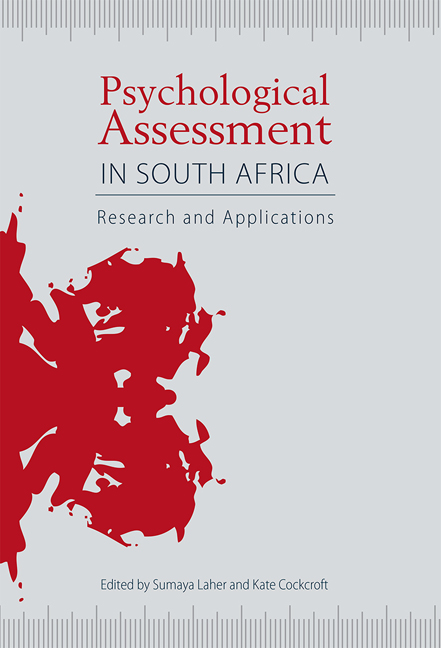Book contents
- Frontmatter
- Contents
- Tables and figures
- Acknowledgements
- Acronyms and abbreviations
- 1 Contextualising psychological assessment in South Africa
- Section One Cognitive tests: conceptual and practical applications
- Section Two Personality and projective tests: conceptual and practical applications
- 14 The Sixteen Personality Factor Questionnaire in South Africa
- 15 Using the Fifteen Factor Questionnaire Plus in South Africa
- 16 The Basic Traits Inventory
- 17 The Myers-Briggs Type Indicator® in South Africa
- 18 The NEO-PI-R in South Africa
- 19 Using the Occupational Personality Profile in South Africa
- 20 The Occupational Personality Questionnaire
- 21 The Millon Inventories in South Africa
- 22 Assessment and monitoring of symptoms in the treatment of psychological problems
- 23 Assessment in routine clinical and counselling settings
- 24 Projective assessment of adults and children in South Africa
- 25 The use of the Children's Apperception Test and Thematic Apperception Test in South Africa
- 26 Projective assessment using the Draw-A-Person Test and Kinetic Family Drawing in South Africa
- 27 The Rorschach in South Africa
- Section Three Assessment approaches and methodologies
- Contributors
- Index
27 - The Rorschach in South Africa
from Section Two - Personality and projective tests: conceptual and practical applications
Published online by Cambridge University Press: 21 April 2018
- Frontmatter
- Contents
- Tables and figures
- Acknowledgements
- Acronyms and abbreviations
- 1 Contextualising psychological assessment in South Africa
- Section One Cognitive tests: conceptual and practical applications
- Section Two Personality and projective tests: conceptual and practical applications
- 14 The Sixteen Personality Factor Questionnaire in South Africa
- 15 Using the Fifteen Factor Questionnaire Plus in South Africa
- 16 The Basic Traits Inventory
- 17 The Myers-Briggs Type Indicator® in South Africa
- 18 The NEO-PI-R in South Africa
- 19 Using the Occupational Personality Profile in South Africa
- 20 The Occupational Personality Questionnaire
- 21 The Millon Inventories in South Africa
- 22 Assessment and monitoring of symptoms in the treatment of psychological problems
- 23 Assessment in routine clinical and counselling settings
- 24 Projective assessment of adults and children in South Africa
- 25 The use of the Children's Apperception Test and Thematic Apperception Test in South Africa
- 26 Projective assessment using the Draw-A-Person Test and Kinetic Family Drawing in South Africa
- 27 The Rorschach in South Africa
- Section Three Assessment approaches and methodologies
- Contributors
- Index
Summary
Psychologists worldwide have used the Rorschach Inkblot Method ever since Hermann Rorschach first published his research in 1921 (Rorschach, 1921/1942). The clinician presents a standard set of ten cards with inkblots and asks the client to indicate what she or he sees on each card, where it is seen and what characteristics of the blot make it look the way it does. Clients’ responses suggest how people perceive and think about their world, solve problems, make decisions, manage stress and view themselves and others. The Rorschach has been accurately described as a perceptual, an associational, an interpersonal and a sequential task. Taken together, these features enable the Rorschach user to come to a remarkably comprehensive interpretation of personality processes and structures (Weiner, 2000).
Those in South Africa who use the Rorschach as more than a mere projective technique currently use the Exner Comprehensive System, into which all of the empirically defensible features of other, earlier approaches have been merged. Exner's work represents a major attempt, mostly successful, at integrating some of the most meaningful contributions of earlier interpretation systems – for example, those of Rorschach himself, Piotrowski, Rapaport, Beck, Hertz and Klopfer. Research regarding the Exner Comprehensive System is still ongoing, also in South Africa.
The Rorschach as a personality test
The main aim of the Rorschach is not to achieve a specific psychiatric diagnosis, but to enhance understanding of the interactive, dynamic personality processes and characteristics of a unique individual (Exner, 2003; Meloy, 2005).
The Exner Comprehensive System enables the Rorschach user to come to wellvalidated conclusions about personality features such as capacity for control and coping with stress, affective functioning, interpersonal perception, self-perception and cognitive processes. The latter include the use of cognitive defences, rationality of thinking, accuracy of perception and problem-solving style. Because it measures personality processes, the data gathered can contribute to identifying conditions that are defined by personality characteristics (Weiner, 2000). Specific diagnostic indices have been developed, but have to be applied with caution, taking into consideration contextual information and the results of other personality tests. These indices include a Suicide Index, a Depression Index, a Perceptual-Thinking Index (picking up on irrational thinking and perceptual distortions often associated with psychosis or organic brain syndromes), a Coping Deficit Index (sensitive to features associated with personality disorders), a Hypervigilance Index and an Obsessive Style Index.
- Type
- Chapter
- Information
- Psychological Assessment in South AfricaResearch and Applications, pp. 394 - 406Publisher: Wits University PressPrint publication year: 2013



